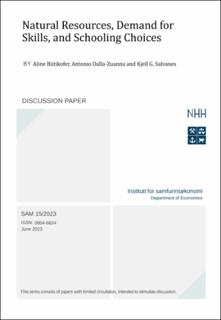| dc.contributor.author | Bütikofer, Aline | |
| dc.contributor.author | Dalla-Zuanna, Antonio | |
| dc.contributor.author | Salvanes, Kjell G. | |
| dc.date.accessioned | 2023-07-03T07:05:59Z | |
| dc.date.available | 2023-07-03T07:05:59Z | |
| dc.date.issued | 2023-06-30 | |
| dc.identifier.issn | 0804-6824 | |
| dc.identifier.uri | https://hdl.handle.net/11250/3075274 | |
| dc.description.abstract | This paper studies the consequences of the buildup of a new economic sector—the Norwegian petroleum industry—on investment in human capital. We assess both short-term and long-term effects for a broad set of educational margins, by comparing individuals in regions exposed to the new sector with individuals in unexposed regions. Importantly, we analyze how the effects and the mechanisms change as the sector develops. Our results indicate that an initial increase in the high school dropout rate is short-lived both because dropouts get their degrees later as adults, and because later-born cohorts adapt to the new needs of the industry by enrolling more in vocational secondary education. We also observe a decrease in academic high school and college enrollment except for engineering degrees. Financial incentives to both completing high school and field of study, are the most likely channels driving these effects. | en_US |
| dc.language.iso | eng | en_US |
| dc.relation.ispartofseries | SAM DP;15/2023 | |
| dc.subject | Natural Resources | en_US |
| dc.subject | Education | en_US |
| dc.subject | Petroleum | en_US |
| dc.title | Natural Resources, Demand for Skills, and Schooling Choices | en_US |
| dc.type | Working paper | en_US |
| dc.subject.nsi | Samfunnsvitenskap | en_US |
| dc.source.pagenumber | 50 | en_US |
| dc.relation.project | Norges Forskningsråd: 262675 | en_US |
| dc.relation.project | Norges Forskningsråd: 316085 | en_US |
| dc.relation.project | NORFACE DIAL grant: 462.16.159 | en_US |
